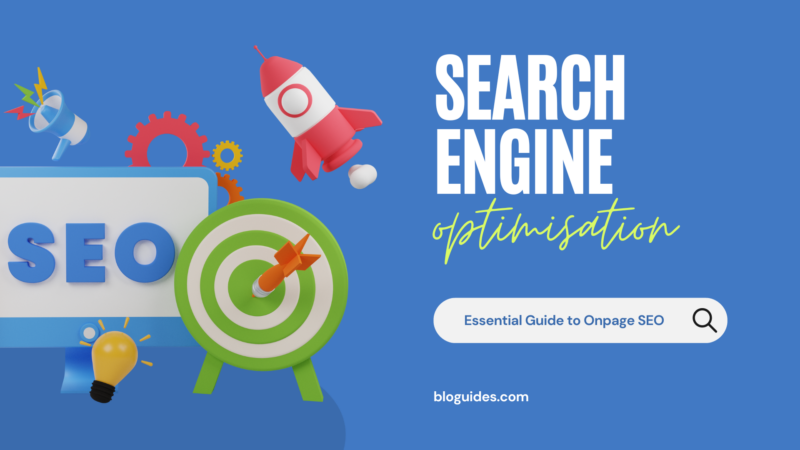
In the digital era, the importance of Search Engine Optimization (SEO) cannot be overstressed, especially when it comes to onpage SEO. This facet of SEO pertains to the optimization of elements directly on your website, ensuring that it not only appeals to search engines but also provides value to users. So, why focus on onpage SEO? The reasons are manifold, and this article will delve into the significance of onpage SEO and how it can be the key to unlocking your website’s potential.
Understanding Onpage SEO: The Foundation of Your Online Presence
Onpage SEO involves optimizing web page content for search engines and users. Common onpage SEO practices include optimizing title tags, content, internal links, and URLs. It’s essential because it helps search engines understand the contents in your website, as well as identify if it is relevant to a searcher’s query.
Why Onpage SEO is Crucial for Your Website’s Success
Onpage SEO is instrumental for search engines to accurately rank your site for the right keywords. It improves your website’s readability for both search engines and users, which can enhance user experience and increase the time they spend on your site—factors that search engines reward with higher rankings.
The Role of Keywords in Onpage SEO
The strategic use of keywords is a pillar of onpage SEO. Keywords help to signal search engines about the topic of your content. However, keyword stuffing can harm your SEO, so it’s important to use keywords thoughtfully and naturally within your content, titles, and meta descriptions.
Content Quality and Onpage SEO
Content is king in the world of SEO. Quality content which provides value to your audience can lead to an increased engagement, longer dwell time, and better rankings. Why focus on onpage SEO? Because it ensures that your high-quality content is optimized for both search engines and people.
Optimizing User Experience Through Onpage SEO
User experience on website is becoming an increasingly important SEO factor. Onpage SEO helps in creating a seamless and user-friendly website. This includes fast loading times, mobile-friendliness, and easy navigation—all of which contribute to a positive user experience and, consequently, better SEO rankings.
The Impact of Onpage SEO on Conversion Rates
Onpage SEO doesn’t just drive traffic—it also helps in converting visitors into customers. By optimizing onpage elements, you can guide users through your website, encouraging them to take the desired action, whether it’s making a purchase, signing up for a newsletter, or downloading a whitepaper.
The Synergy Between Onpage SEO and Offpage SEO
While onpage SEO refers to factors you can control on your own website, offpage SEO involves external factors such as backlinks. Both are crucial for your SEO strategy, but without a solid onpage foundation, your offpage efforts may not be as effective.
Continuous Improvement: The Ongoing Process of Onpage SEO
SEO is not a set-it-and-forget-it task. Why focus on onpage SEO? Because it requires ongoing attention and adjustment. As search engine algorithms evolve, so must your onpage SEO strategies. Regularly updating and refining your website is crucial for maintaining and improving your search rankings.
Conclusion:
Focusing on onpage SEO is essential for any business that wants to succeed online. It helps search engines understand your content, enhances user experience, improves conversion rates, and works in tandem with offpage SEO. By investing in onpage SEO, you’re setting your website up for long-term success in the competitive online marketplace.
FAQs:
Q: What is onpage SEO and why is it important?
A: Onpage SEO refers to the practice of optimizing web pages to rank higher in search engines and earn more relevant traffic. It’s important because it helps search engines understand your website and its content, as well as assess whether it is relevant to a searcher’s query.
Q: How often should I focus on my onpage SEO?
A: Onpage SEO is not a one-time task but an ongoing process. It’s best to regularly review and update your onpage SEO strategies to keep up with search engine algorithm changes and the evolving needs of your users.
Q: Can onpage SEO improve user experience?
A: Yes, good onpage SEO practices improve the user experience by making web pages load faster, be more navigable, and more easily understandable by both users and search engines.
Q: Is onpage SEO more important than offpage SEO?
A: Both onpage and offpage SEO are important. Onpage SEO is about making your site better for both search engines and users, while offpage SEO is mostly about enhancing your site’s authority through backlinks. You need both to succeed in SEO.
Q: Do keywords still matter for onpage SEO?
A: Keywords are still vital for onpage SEO as they help search engines understand what your content is about. However, they should be used naturally and in context to avoid penalties for keyword stuffing.
Q: How does onpage SEO affect conversion rates?
A: Onpage SEO can positively affect conversion rates by making your site more user-friendly and content more compelling, which can encourage visitors to take action, such as making a purchase or signing up for information.
Q: Can onpage SEO help with mobile rankings?
A: Absolutely. Mobile-friendliness is a significant ranking factor, and onpage SEO includes optimizing your site for mobile devices to ensure it performs well on these platforms.
Q: What are some common onpage SEO mistakes?
A: Some common onpage SEO mistakes include ignoring title tags and meta descriptions, poor content quality, not optimizing for mobile, slow page load times, and failing to include internal links or optimize for user experience.



